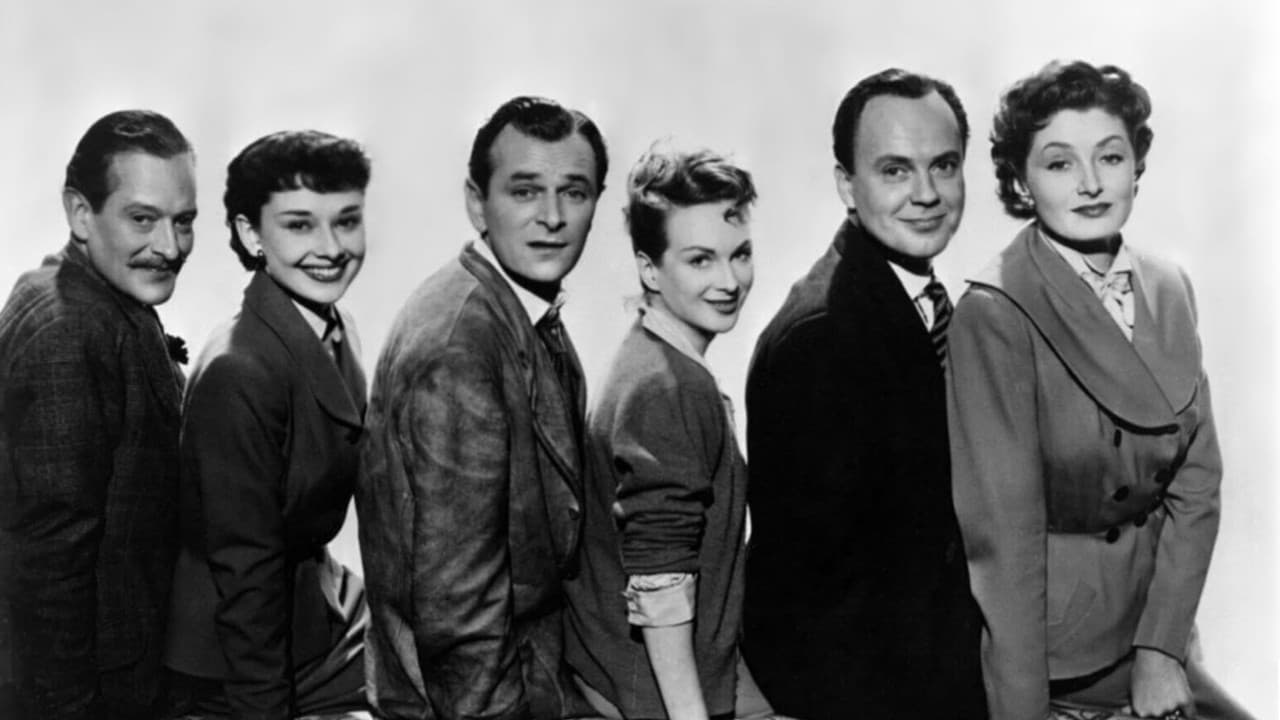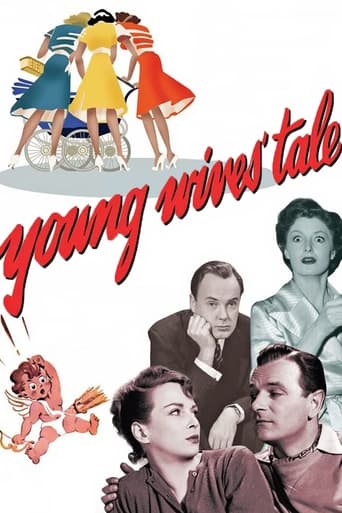

Very well executed
... View MoreVery disappointed :(
... View Morenot horrible nor great
... View MoreGreat visuals, story delivers no surprises
... View MoreThis is a movie version of one of those brittle post-war stage farces, originally written by Ronald Jeans. Given then-current housing shortages, two couples -- Joan Greenwood & Nigel Patrick; Derek Farr & Helen Cherry -- are sharing a house. Each has one toddler, and only Miss Greenwood to work act dogsbody for the menage. Given her super-posh accent, she is an absolute flub at it, but she does get to show some athleticism as she leaps from one disaster to the next. When Miss Cherry locates a decent nanny for the children in the person of Athene Seyler, everyone thinks for a moment that the situation is saved, but for the purposes of the plot, they tell her the children are siblings, and she believes Miss Greenwood is married to Mr. Farr. The usual comedy of misconstruction ensues, carried on by speed by and the abilities of the cast. Alas, the effort never quite opens up beyond its stage origins.Movie fans will want to see this for a sizable supporting role by Audrey Hepburn. She plays a young woman who has a room in the house and whose salient quality is she is terrified of men. Although her character connects loosely with the plot at several points, I had the distinct impression that at some stage of the movie's origins -- perhaps before the play actually opened -- the role was actually much larger. Now it is largely vestigial, even if it is the main reason the movie is remembered.
... View MoreThis is one of those mediocre British farces from the early 1950s were every one rushes around talking as loudly as they can in the hope that the volume of their speech will make up for the paucity of wit contained in the script.The leading pair are Nigel Patrick in an unusual domestic role,for him anyway,and the delectable Joan Greenwood,who had recently starred magnificently in Kind Hearts and Coronets.Supporting them adequately are Helen Cherry,Guy Middleton and Athene Seyler.However the main matter of note is the featuring of Audrey Hepburn who would not long be constrained by her contract with Associated British picture Corporation.I doubt that she remembered this film with any fondness.
... View MoreDuring a housing crisis in post-war Britain couples shared accommodations and often times problems arose. This 'comedy' was meant to parody situations of that nature, adding mild slapstick and rapid fire one-liners. It failed miserably back then and on viewing it recently, seemed like a pointless sketch of people wasting their time.While the British are responsible for some fine films, they also made some very bad ones (often referred to as 'B' movies). No wonder so many up and coming British actors migrated to Hollywood. Critics, at the time had no mercy on Director Henry Cass for this one.The sophisticated, lovely Joan Greenwood and Nigel Patrick are the young couple the Pennants, and Derek Farr and Helen Cherry, the Bannings, living together in a house with a single female roomer (Audrey Hepburn). Although IMDb's plot summary says the story centers around the young roomer's (Hepburn) infatuation with one of the husbands, it actually centers around one of the wives (Ms Greenwood, who gives a spirited, but sometimes annoying performance). From there comes a series of small situations that, for the most part are pretty lame and not very funny (at least by today's standards,and the critics back then, if you were to believe them, didn't find it funny either).It was better than some of television's new sitcoms however.It was reported by one of Ms Hepburn's biographers that Henry Cass was the only director in her entire career that 'she did not like working with'. Indeed, Cass was referred to as the 'tyrannical director', often finding actors to pick on for whatever reason. He chose Audrey as his whipping boy, and she only got through the making of this film under the protection of Ms Greenwood and Mr Patrick. Despite all the hell Cass was giving her, she still managed to show a hint of her screen appeal, and natural acting ability. She lit up the screen every time she appeared, and for that reason alone I gave the film a 6 star rating.Of course, you'd have to be a Hepburn fan to truly appreciate this film. It came out in 1951, but was re-released in 1954 to capitalize on Audrey's success with 'Roman Holiday'. I got my VHS copy from a film collector who was cleaning out his 'attic'. I would watch it again for the historic aspect of it. and because Miss Hepburn's speaking part is extended past those earlier walk-in roles she did.Overall, worth a watch if you can find a copy, and for me, this is a keeper.
... View MoreI love this comedy and have watched it umpteen times. I haven't seen it for a while so the details of the plot escape me, but they don't really matter. What is so good about it is the unselfconscious depiction of London picking itself up after World War II, and the relaxed comedy style of the actors, most of whom will be familiar faces to anyone who watched British TV in the '70s too. Joan Greenwood is a dream as usual - watch out for the vault over the sofa - as a young housewife feeling ever so slightly bored with staying at home and the continuing hardships of the period - and where else could you see Athene Seyler, Fabia Drake and Irene Handl all together? Last and far from least there is a charming appearance from Audrey Hepburn in her fifth film. The men are good but this is really a treasury of female performances. It's all very light and stylish without being over-glamorous, very refreshing.Also, for serious buffs, the cinematographer was the great Erwin Hillier who worked with F.W. Murnau on 'Tabu', with Fritz Lang on 'M', and with Powell and Pressburger on 'A Canterbury Tale' and 'I Know Where I'm Going', and many other major movies.
... View More